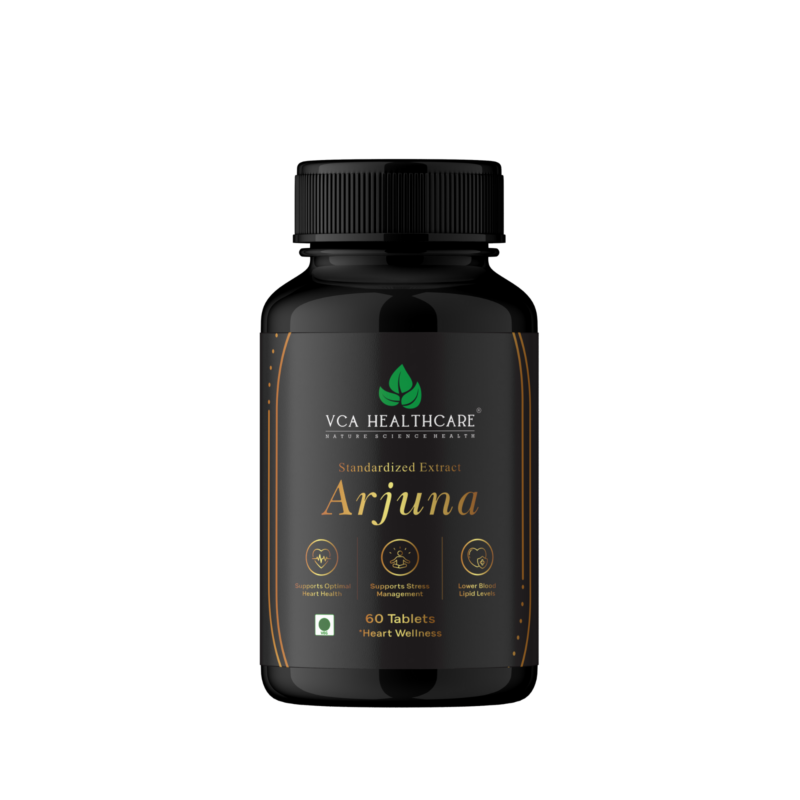Arjuna Herb in Ayurveda: Benefits, Uses, and Side Effects – A Complete Guide
Table of Contents:
- Introduction to Arjuna Herb (Terminalia Arjuna)
- Historical Significance of Arjuna in Ayurveda
- What is Arjuna Ki Chaal (Arjuna Bark)?
- Health Benefits of Arjuna Herb
- How to Use Arjuna Ki Chaal (Arjuna Bark)
- Precautions and Side Effects of Arjuna Herb
- Arjuna Herb for Heart Health – A Deeper Dive
- Arjuna Ki Chaal in Skin Care
- Arjuna in Ayurvedic Formulas – Popular Products
- Arjuna Herb in Modern Research
- Conclusion
1. Introduction to Arjuna Herb (Terminalia Arjuna)
Arjuna, or Terminalia Arjuna, is a treasure trove of health benefits and has been an important herb in Ayurveda for centuries. You might have heard of it in the context of heart health, but this herb offers so much more. The name “Arjuna” actually comes from the tree itself, which is native to the Indian subcontinent. The bark of this tree, called Arjuna ki Chaal, is the hero of this herb, packed with incredible medicinal properties.
From ancient times, Arjuna has been used to address various health issues, particularly those related to the heart, skin, and overall well-being. Whether you’re looking to support your cardiovascular health, improve your skin, or just boost your overall health, Arjuna might just be the herb you need.
In this blog, let’s take a deep dive into everything Arjuna has to offer. We’ll explore its rich history in Ayurveda, its benefits for modern-day health, how to use it, and even touch on some of the precautions you should be aware of.
2. Historical Significance of Arjuna in Ayurveda
Arjuna has been a cornerstone in traditional Ayurvedic medicine for over 3,000 years. Ancient texts like the Charaka Samhita and Sushruta Samhita extol Arjuna for its effectiveness in treating various ailments, especially heart-related conditions. Its use in rituals and healing practices was common in many cultures across India, where it was considered a symbol of strength and vitality.
Arjuna’s healing properties were particularly attributed to its ability to enhance heart function, purify blood, and support the circulatory system.
3. What is Arjuna Ki Chaal (Arjuna Bark)?
Arjuna ki Chaal refers to the bark of the Terminalia Arjuna tree, which is the most commonly used part of the plant in Ayurveda. It is harvested from the tree’s trunk and used in various forms, including powder, extracts, and decoctions. The bark is rich in compounds like tannins, saponins, flavonoids, and glycosides, which are responsible for its numerous health benefits.
4. Health Benefits of Arjuna Herb
Arjuna Herb is celebrated for its diverse therapeutic properties. Here are some of the key benefits:
Cardiovascular Health : Arjuna is most renowned for its benefits to heart health. It helps strengthen the heart muscles, improve blood circulation, and regulate blood pressure. Studies suggest that Arjuna bark helps prevent atherosclerosis (the buildup of plaque in arteries), reduces cholesterol levels, and improves overall heart function.
Skin Health: Arjuna’s antioxidant and anti-inflammatory properties make it a popular ingredient in Ayurvedic skincare products. It can help treat skin conditions like acne, eczema, and psoriasis by detoxifying the skin and reducing inflammation.
Weight Loss: Arjuna has been found to aid in weight loss by promoting fat metabolism. It is often included in Ayurvedic formulations aimed at detoxifying the body and supporting weight management.
Anti-inflammatory Properties: The herb’s anti-inflammatory compounds help reduce inflammation, making it effective for conditions like arthritis and joint pain.
Bone Health: Arjuna strengthens bones and helps in the regeneration of bone tissue, making it beneficial for conditions like osteoporosis.
Stress and Anxiety Reduction: Arjuna has adaptogenic properties, helping the body adapt to stress. It can help reduce anxiety and improve mental clarity.
5. How to Use Arjuna Ki Chaal (Arjuna Bark)
Arjuna ki Chaal can be used in several forms, each offering different benefits.
Arjuna Ki Chaal Powder: One of the most common ways to use Arjuna is in powdered form. The powder can be mixed with warm water or herbal teas to promote heart health, reduce inflammation, and improve skin condition.
Arjuna Bark Tea: To prepare Arjuna bark tea, boil a few pieces of the bark in water for about 10-15 minutes. Drinking this tea daily can help with cardiovascular issues, detoxification, and skin health.
Arjuna Herb in Capsules and Tablets: For those who prefer a more convenient form, Arjuna is available in capsules or tablets. These are effective in delivering a standardized dose of the herb’s active compounds.
Arjuna Tincture: Arjuna tinctures are liquid extracts of the herb that can be consumed in small doses. This form is ideal for those who prefer quick absorption and ease of use.
6. Precautions and Side Effects of Arjuna Herb
While Arjuna is generally safe for most individuals, it’s important to take precautions:
- Pregnancy and Breastfeeding: Pregnant or breastfeeding women should consult a healthcare professional before using Arjuna.
- Interaction with Medications: Arjuna may interact with blood-thinning medications or other cardiovascular drugs, so it’s important to check with a doctor if you’re on such treatments.
- Excessive Use: Overconsumption of Arjuna can lead to digestive issues, nausea, or diarrhea. It is recommended to stick to the recommended dosage.
7. Arjuna Herb for Heart Health – A Deeper Dive
Arjuna’s primary benefit lies in its ability to support heart health. It has been shown to:
- Strengthen the heart muscles
- Lower cholesterol and triglyceride levels
- Regulate blood pressure
- Improve circulation and oxygen supply to the heart
- Prevent and manage conditions like angina and arrhythmias
8. Arjuna Ki Chaal in Skin Care
Arjuna’s powerful antioxidant and anti-inflammatory properties make it an excellent herb for skincare. It helps:
- Detoxify the skin
- Reduce the appearance of wrinkles and fine lines
- Treat acne and eczema
- Improve skin elasticity and firmness
9. Arjuna in Ayurvedic Formulas – Popular Products
It can be found in many Ayurvedic skincare products, including face packs, serums, and creams.
Arjuna is often included in popular Ayurvedic formulas like:
- Arjuna Heart Care Tablets: Used to support heart health and reduce blood pressure.
- Arjuna Churna: A powdered form used to manage stress, heart health, and skin conditions.
- Arjuna Oil: Used for massage therapy to promote circulation and skin health.
10. Arjuna Herb in Modern Research
Modern research continues to validate many of the traditional uses of Arjuna. Studies have shown that Arjuna possesses antioxidant, anti-inflammatory, and heart-protective properties. Its use in cardiovascular health is particularly well-supported by scientific studies, making it an increasingly popular supplement in modern wellness.
Conclusion
Arjuna Herb, particularly its bark (Arjuna Ki Chaal), offers a wealth of benefits for heart health, skin, weight loss, and overall wellness. Its time-honored use in Ayurveda is backed by modern scientific research, confirming its potency in improving cardiovascular health, reducing inflammation, and promoting healthy skin. Whether used in powder, tea, or capsule form, Arjuna is a valuable addition to any holistic wellness routine.
Frequently Asked Questions
Arjuna is primarily used for heart health, skin care, and stress management. It also has anti-inflammatory, antioxidant, and weight loss benefits.
You can consume Arjuna in the form of powder, tea, tablets, or tinctures. The powdered form can be mixed with water or herbal tea, while tablets are a more convenient option.
Arjuna is generally safe but should be used cautiously by pregnant or breastfeeding women and those taking blood-thinning medications. Overuse can lead to digestive disturbances.
Yes, Arjuna is known to help regulate blood pressure and improve heart function. It is often used in Ayurvedic formulations aimed at managing hypertension.
The time frame for results can vary depending on the condition being treated and the individual. For heart health, benefits may be seen after a few weeks of consistent use.



